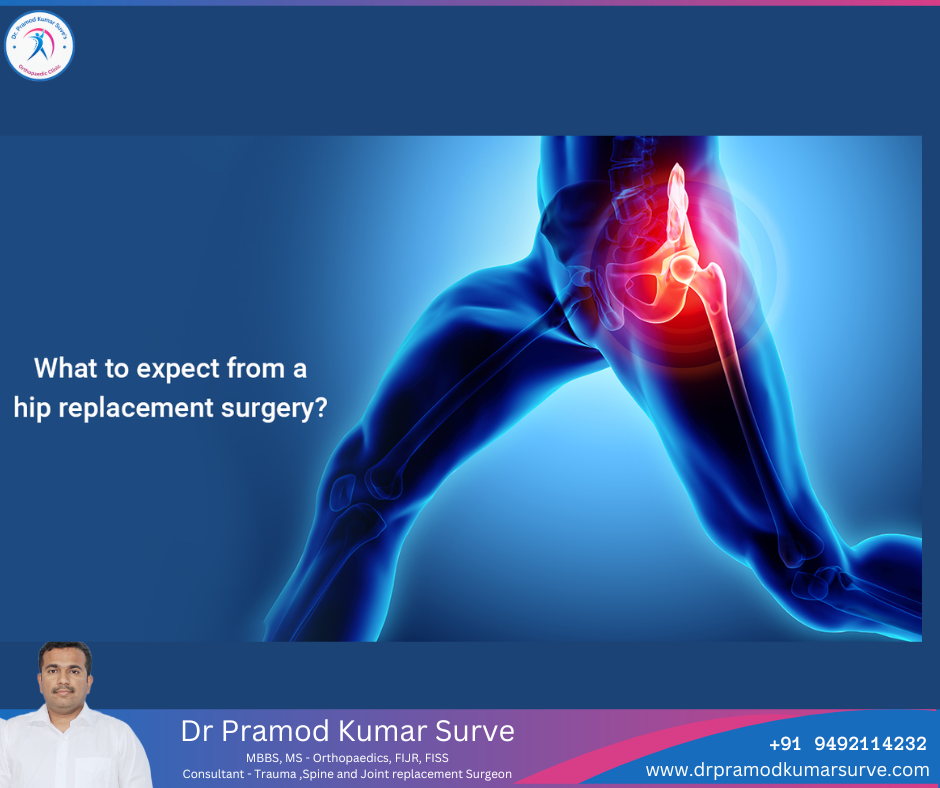Hip replacement surgery is required when a certain section of the hip joint is injured or goes through wear and tear, and the procedure is known as hip arthroscopy. Hip-replacement surgery is less common than knee-replacement surgery. During this procedure, the expert orthopedic surgeon usually removes the damaged section of the hip joint and then tries to replace it with an artificial implant that is usually made up of ceramic, metal, or very hard plastic. These artificial joints are also known as prostheses. Usually, orthopedics from the best hospital in Pune recommend hip replacement surgery only when the patient is unable to perform daily activities and all the non-surgical treatments have failed to provide any kind of relief from the pain. Further, individuals who suffer from arthritis suffer from a lot of wear and tear on the hip joint that requires hip replacement surgery in order to restore its function and get relief from the pain.
Why is there a need for hip replacement surgery?
There are several conditions due to which an individual might require a hip joint replacement, Some of the reasons are as follows:
- Injury or accident is one of the primary reasons for which an individual requires hip replacement surgery. Usually, such types of injuries are quite common in old age.
- In cases where a person suffers from chronic hip joint pain and does not get any relief from the pain using medications and other non-surgical methods, hip replacement surgery becomes more than necessary.
- Rheumatoid arthritis is a condition that is caused by an overactive immune system that causes inflammation and erosion of cartilage, damage, and deformity of the hip joint, which requires replacement surgery from the best hospital in India.
- Osteoarthritis is another condition that causes wear and tear of cartilage around the hip joint that obstructs the smooth movement of the hip joint and requires hip replacement surgery.
- Further, in conditions where the pain persists and affects the ability to walk, it causes interference in sleep, difficulty sitting, walking, climbing stairs, etc. In such conditions, hip replacement surgery becomes important.
What should I expect?
Hip replacement Surgeon in Hadpsar is a safe procedure and does not have many complications associated with it. Firstly, the anesthesiologist provides anesthesia to numb the lower half of the body so that one does not feel any kind of pain during the procedure. The surgeon might also inject numbing medicine around the nerves around the hip joint in order to block the pain after the surgery.
During the procedure, firstly, the surgeon makes an incision over the hip and tries to remove the disease, injured or damaged bone, and cartilage, along with the tissues around it. Then, very carefully, the implant is placed in the socket and into the pelvic bone with absolute precision. The laparoscopic technique is used in order to perform such a procedure as it requires smaller incisions, fewer scars, and does not have any risk of excessive bleeding or injury while operating. Further, it provides better results as it has a faster recovery rate.
Risk factors or complications
- Infection is one of the primary risk factors that usually concerns surgeons. Infection is usually caused at the site of the incision and near the prosthesis. Therefore, the doctor uses antibiotics in order to minimize the risk of having any kind of infection during or after the surgery.
- During the surgery, there is always a risk of a fracture while removing or placing the hip joint. Sometimes the fracture could be minor, but in the case of a major fracture, the doctor might recommend a bone graft, metal plate, screws, and wires in order to stabilize the joint.
- There is always a complication of loosening the implant, as your implant might not be fixed properly or might get loose over time, causing pain and discomfort.
- Nerve damage is one of the rarest and most dangerous types of risk factors, as it might cause numbness, weakness, excruciating pain, paralysis, and other worse types of conditions.
- Blood clots can form in the veins after the surgery, which could be dangerous as they can obstruct the blood flow and travel to the lungs or heart, which might cause life-threatening conditions.
